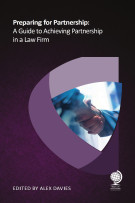Resolving business disputes early - so that they don’t escalate into full-blown litigation
15 January 2019

Hildebrand Mediation
In our latest blog, Andrew Hildebrand, leading commercial mediator, explores how mediation can be invaluable for helping people resolve business issues and avoid protracted legal disputes. This is the third in a short series of blogs on disputes involving business partners and family members.
In this month’s briefing on Partnership, Family Business and Private Client disputes, leading mediator Andrew Hildebrand explores how mediation can be invaluable for helping people resolve business issues and avoid protracted legal disputes.
Rather than confront conflict, people tend to avoid it, or avoid each other, until something snaps. When it does, fallings out can be serious, and they can affect work relationships and family gatherings.
Outside the world of commercial litigation, people rarely know about mediation, or how helpful it can be if you use it to deal with issues when they flare up. Especially where relationships are involved. Because, unlike other forms of dispute resolution, like say litigation or arbitration, you don’t need to wait until the damage has been done. Mediation allows people to settle issues safely, inexpensively and confidentially without destroying themselves, their family or their business - and if they mediate early enough, maybe salvage their relationship too. In that sense, it works like marriage guidance.
You can use mediation:
- Where people have different ideas about how a business should be run, or who should be running it. If left unchecked, these types of issues often escalate into paralysing or destructive power struggles within a business.
- Where people are worried about how they might be affected by change. That ‘change’ could be about possible plans affecting the future of the business, or because of a death, divorce, or family rift. It could be over a succession or shareholder issue, or where a client wants to give their children monies while they are still alive and to be seen to be acting fairly, taking into account the children’s different financial needs.
- Where people have competing needs or interests, especially financial ones. Or where someone’s personal interests conflict with what the business needs.
- Where a rift is becoming personal. Where close relationships are involved, commercial issues can easily be complicated by how someone is feeling or behaving. That, in turn, can be exacerbated by past altercations, unresolved misunderstandings or perceptions, and by conflicting hopes. In a family business or private client context, for example, the real issues could be to do with the family, and may even be triggered by events going back to someone’s childhood. (Don’t under-estimate who didn't get the red shiny bicycle).
- Or a rift between a business founder/owner and business colleagues or family members. In a family business, for example, it might be about competitive siblings, or the treatment of family and non-family members.
- Where inter-generational issues need addressing. In a family business, for example, maybe the younger generation wants control sooner than the older generation is prepared to relinquish it, or maybe there are competing siblings.
And it isn’t just about using mediation early when a dispute flares up. Mediation can also be invaluable to prevent issues arising in the first place. Or to stop conversations descending into the usual arguments. Or when an awkward conversation needs to be had and a client doesn't feel like doing it themselves, or is worried about it going off half-cocked.
It is worth considering whenever you feel that your client and their partner/family might just benefit from someone independent coming in to knock heads together and keep them all safely on track.
If you have any thoughts or questions about whether a mediation could help a client, please contact me in confidence.
Globe Law and Business recently published the STEP Handbook Business Families and Family Businesses, a comprehensive guide for practitioners who advise business families and their professional advisers. Andrew co-wrote the chapter ‘Dealing with Conflict’ with Mark Lindley of Boodle Hatfield. For further details and to contact Andrew, please go to http://hildebrandmediation.com/













Any comments - send us an email